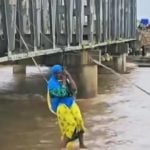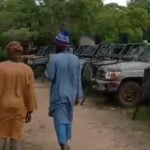Atiku Abubakar, former vice-president and di presidential candidate of di Peoples Democratic Party (PDP), bin make plenti claims as e dey present im economic plans for one recent event wey di Lagos Chamber of Commerce and Industry (LCCI) organise.
Di former vice-president bin tok for di 2022 edition of di LCCI private sector economic forum.
TheCable check some of di claims, and na wetin we find be this.
CLAIM 1: “Na budget deficit APC dey take run Nigeria every year since dem enter power in 2015.
FINAL TOK: Since 2015 wey APC enter power, na with budget deficit dem dey take operate di kontri.
Federal budget deficit na wen di moni wey govment dey spend plenti pass di moni wey dey enter. Di Economic Times explain sey revenue deficit for govment na usually percentage of di gross domestic product (GDP).
TheCable check see sey true true, di Buhari govment dey use budget deficit since 2015 wey dem enter power. But na so di Nigerian economy don dey since oda govments since 1981.
Except for 1995 and 1996 when di Nigerian government record budget wey bin plenti come remain, Nigeria don dey run on fiscal deficit since 1981.
CLAIM 2: “Most of di times, di budget deficits wey Nigeria record under di Buhari administration dey pass 3% wey di Fiscal Responsibility Act permit.”
FINAL TOK: Na true. Di Nigeria budget deficit as percentage of GDP bin pass di 3% line for 2017, 2019, 2022 and 2021. Na four times within 7 years bi that.
According to informate from di Central Bank of Nigeria (CBN) and di Budget Office of the Federation wey PricewaterhouseCoopers (PwC) bin publish, di Buhari government bin pass di 3% fiscal borrowing line for 2017, when e bin record 3.17%.
Di PwC report tok sey between 2019 and 2021, dem bin dey constantly pass di 3% line steady
| Year | Budget deficit as a percentage of GDP |
| 2010 | -2.o2 |
| 2011 | -1.84 |
| 2012 | -1.36 |
| 2013 | -1.4 |
| 2014 | -0.94 |
| 2015 | -1.65 |
| 2016 | -2.63 |
| 2017 | -3.17 |
| 2018 | -2.84 |
| 2019 | -3.41 |
| 2020 | -3.57 |
| 2021 | -3.93 |
Source: Central Bank, Budget Office of the Federation and PwC.
The Nigeria Fiscal Responsibility Act 2007 gree for budget deficit wey pass 3% of di GDP only when e be like sey kasala wan burst for di kontri. The act sey na only di president fit make that kain decision.
Ikpefan Ochei, professor of finance for Covenant University, tell TheCable sey since 2015, Nigeria no dey fit hold body ontop fiscal borrowing matter, im sey na mostly because of di oil price wey dey always shake.
“Oil na still one of di main source of moni for Nigeria. Di oil and gas sector, wey dey help di economy tanda well don fall 19 times out of 30 quarters since 2014, compared to di average of $108.56 for 2013 and $111.63 for 2012,” na so di finance expert tok.
“For democracy where di govment must perform no matter how di economy dey, crime no dey if govment wan borrow moni, as long as na to use am do beta work and no bi to chop.”
CLAIM 3: “Di common Nigerian no fit afford basic tins. One loaf of bread don increase by 100% since 2020.”
FINAL TOK: No bi true. Di cost of one loaf of bread don increase by 52% for sliced and 55% for unsliced bread — no bi 100% as Atiku claim.
Informate wey comot from di National Bureau of Statistics (NBS) for July 2022 show sey di average cost of bread (500g) across di kontri na N486.27 for sliced bread and N447.16 for unsliced bread.
Meanwhile, for July 2020, di average cost of bread (500g) bin dey at N318.5 for sliced and N287.7 for unsliced.
Di difference for di average cost of bread between July 2020 and July 2022 tanda at N167.7, representing 52.6% increase for sliced; and N159.46 for unsliced, e rise by 55.4%.
CLAIM 4: “Now, farmers dey pay more than 200% for one bag of fertiliser compared to di price for 2020.”
FINAL TOK: Na true. In fact, di cost of fertiliser don increased by 300%.
Di brand of fertilisers wey Nigerian farmers dey use pass na NPK and urea.
For 2020, di federal govment bin reduce di price of 50kg NPK 20.10.10 fertiliser from N5,500 to N5,000 under di presidential fertiliser initiative (PFI).
Na part of di palliatives wey federal govment bin introduce to reduce di effect of di COVID-19 pandemic on farmers and other users.
Informate wey comot for March 2022 by Africa Fertilizer wey folo join hand with di International Fertilizer Development Center (IFDC) bin check di cost of NPK 20:10:10, NPK 15:15:15 and urea for five states: Niger, Kwara, Edo, Anambra, Kano, Kaduna.
Dem bin dey sell di urea fertiliser at an average price of N16, 500 for March 2022, while di average price of NPK 20:10:10 bin tanda at N15, 400 and NPK 15:15:15 at N16, 500.
Comparing di cheaper N5,000 for 2020 and di average price of NPK fertiliser for March 2022 show increase of 230%.
Five months after IFDC bin release di report, Gideon Nagedu, di executive secretary of the Fertiliser Producers and Suppliers Association of Nigeria (FEPSAN), confam sey di price of fertiliser don increase by 300% across di kontri.
“Na di first time wey e dey reach 300% bi this. E never hapun before. Na because you no even fit see am. E dey all over di world, no be just for Nigeria. Na di problem be that,” na so dem tok sey e tok.
Di Nigerian government don blame di war wey dey hapun for Ukraine as di reason why fertiliser don cost.
CLAIM 5: “Di number of youths wey no get work don increase by 9 million — from 4 million for 2015 to 13 million for 2020.”
FINAL TOK: Na true. Di claim Atiku make wey sey di number of youths wey no get work for Nigeria don increase by nine million between 2015 and 2020 correct.
TheCable check di 2015 and 2020 unemployment informate from the National Bureau of Statistics.
As we add the informate wey show di age between 15-24 and 25-34, e show sey for 2015, di number of youths wey no get work bin tanda at 3.65m, 4.0m, 4.96m and 5.30m for all di four quarters.
Di NBS bin only publish di labour force informate for di second and fourth quarters of 2020. Q2 bin record 13.98 million unemployed youth while Q4 tanda at 12.72 million.
CLAIM 6: “In just five years, between 2015 and 2020, di number of pipu wey bin get work drop by 54%, from 68 million to 31 million people.”
FINAL TOK: No bi true. E no get any time for 2015 wey di number of pipu wey get work reach 68 million, based on informate from di NBS.
NBS data show sey more dan 23.1 million pipu out of di total labour force of 69.6 million bin no get work around di last quarter of 2020.
Informate from NBS show sey di total number of pipu wey bin get full time work for Nigeria for Q1 2015 na 55.69 million; Q2 bin dey at 54. 37 million; Q3 tanda at 55.21 million while Q4 reach 54.50 million.
Meanwhile, for 2020, NBS bin only comot labour force data for Q2 and Q4. Dem put di number of Nigerians wey get work for Q2 at 35.5 million and for Q4, dem tok sey na 30.57 million.
As we compare di numbers of all di Nigerians wey get full time work for di fourth quarters of 2015 and 2020, na difference of 43.90% we see. Di same method for di second quarter of 2015 and 2020 come show difference of 34.55%.
CLAIM 7: Electricity dey under di exclusive legislative list.
FINAL TOK: E no correct. Electricity dey under di concurrent legislative list no bi di exclusive list.
As e dey explain im plan to beta di power sector, Atiku sey “for di medium term, I go propose law wey go make sure sey dem comot all di electricity from di exclusive list and I go make sure sey na states go dey in charge of dia own electricity – anyhow dem wan run am.”
Nigeria dey practice federal system of govment wey di law tok sey na federal, state and local councils go dey share power. So we get di exclusive legislative list, concurrent legislative list, and residual legislative list.
Di exclusive legislative list na for di federal govment. Di concurrent legislative list na for di federal and state govment to run as dem want as long as anytime wen dia law jam, na di law of di federal govment go win.
Di house of assembly for state get di exclusive power to rule for matter wey no dey inside di exclusive or concurrent list.
Electricity no dey for di 68 items on di exclusive legislative list of di 1999 constitution.
TheCable tok with Olusola Akinyemi, lawyer and policy analyst, wey explain di matter wella.
“Part 2 of di second schedule of the 1999 constitution, under paragraph 13 and 14, tok sey di state government fit only generate and distribute electricity to only di areas wey di national grid system no cover for di state,” na so im tok.
Akinyemi sey maybe Atiku bin dey try tok sey if im become president, im govment go make sure sey state govments go get di power to generate, transmit and distribute electricity to areas wey di national grid no cover for di state.





